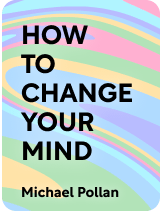

This article is an excerpt from the Shortform book guide to "How to Change Your Mind" by Michael Pollan. Shortform has the world's best summaries and analyses of books you should be reading.
Like this article? Sign up for a free trial here.
What are the effects of psychedelics on the brain? Why is it hard to describe the psychedelic state?
According to How to Change Your Mind by Michael Pollan, the psychedelic state is incredibly difficult to describe because of how transcendent and hallucinatory it is. Further, there have been reports that individuals who’ve used psychedelics interpret and filter information differently than those who haven’t.
Continue reading to learn more about what psychedelics do to the brain.
The Indescribability of the Psychedelic State
One of the biggest challenges with understanding the effects of psychedelics on the brain is that the experiences themselves are notoriously difficult to describe—participants almost always express a lack of ability to put the experiences into words. When they do describe them, the experiences tend to sound like hallucinatory or dream-like events, or even like spiritual clichés—for example, the description that “everything is love” or the sense of “oneness with the universe.”
Other common descriptions of psychedelic experience include:
- The feeling that one communicated with God, or became a god oneself
- The dissolving of one’s sense of self and/or the merging of self with others/everything
- The realization that death is an illusion and that consciousness survives it
- The sense that one is being born or giving birth (in one of his trips, Pollan experienced the feeling that he was giving birth to himself)
- A deep sense of connectedness with, and reverence for, nature
- Encounters with loved ones, alive or dead
These trips are usually accompanied by vivid sensory experiences of the outer and/or inner world. Psychedelic-assisted therapy often takes place with a mask covering the subject’s eyes, so the subject experiences all of their “visions” in their mind. But those who have psychedelic experiences in a non-clinical setting, without their eyes covered, tend to experience the outer world, especially nature, as particularly colorful, beautiful, and awe-inspiring.
Pollan presents two possible explanations for what happens when one undergoes a psychedelic experience:
- The chemicals act on the brain to trigger activity that produces hallucinatory experiences. Or,
- The chemicals open up our perception to real things that we don’t perceive in our normal waking consciousness.
But, upon reflecting on these two possible explanations, he asks: Does the distinction really matter? When talking about experiences like “oneness with the universe,” how can you distinguish between whether it was a “real” experience or a drug-induced hallucination? Pollan ultimately concludes that it’s an irrelevant question, because whatever chemical reaction is happening, the insights, revelations, and psychological effects are undoubtedly as real as anything else—and maybe more so.
The Ancient Greek Secret of Dying Before Dying
In The Immortality Key, Brian Muraresku makes a connection between the descriptions of modern psychedelic research subjects and those of the Eleusinian Mysteries in ancient Greek literature. The Mysteries were a secret cult practice at the heart of the religious tradition in Greece that existed for almost 2,000 continuous years. According to Muraresku’s research, in descriptions of the Eleusinian Mysteries, it’s said that the ancient secret was that one must die before dying. Initiates reported undergoing a transformative experience involving a metaphorical death and rebirth and emerged with a sense of their own immortality. These descriptions are among Muraresku’s evidence supporting his argument that participants in the Mysteries were consuming psychedelics.
The theme of death, rebirth, and immortality resurface often in descriptions of psychedelic experiences, from cultures around the world and throughout history. He also points to ancient Greek sources stating that the ritual wine was a “drug against grief” and a “treatment for misery,” and that without these rituals life would be unlivable. This is consistent with modern-day psychiatric research such as that at Johns Hopkins, which suggests these treatments have great potential for healing psychological trauma and easing end-of-life suffering and fear of death. Muraresku believes we could be on the verge of rediscovering the secrets that ancient Greeks believed made life worth living.
What Do Psychedelics Do to the Brain?
While research into the neurological effects of psychedelics is young, and researchers haven’t yet pieced it all together, some theorize that the substances may affect the way our brains filter or interpret information. Pollan says this research challenges conventional notions that the experiences are “hallucinations.”
Researchers at Imperial College in London in 2009 looked at brain scans of people undergoing psychedelic experiences with psilocybin. They expected to see increased brain activity, and that was the case for some regions, including those associated with emotions and memories—particularly otherwise subconscious ones. Considering the experiences people describe, this was not surprising. But what was surprising was the reduced activity in the “default mode network”—a network of brain regions responsible for our sense of self as a distinct individual.
(Shortform note: Higher connectivity in the default mode network is also seen in depressed and lonely people. This is because these regions are associated with rumination, or mentally fixating on oneself and one’s problems, rather than being fully in the present. Relaxation techniques like mindfulness meditation quiet down this network, and experienced meditators have consistently less active default mode networks.)
This network is also responsible for filtering information from the outside world. Pollan says this filter allows us to operate more efficiently by allowing only the most important pieces of information in at any given time. So, he explains, because this default mode network is suppressed during a psychedelic experience, that means the brain is letting in sensory input that’s normally restricted. We know, for example, that people see colors differently (often perceiving them as brighter) and hear music in a more intense and nuanced way under the influence of psychedelics.
So, Pollan says the brain research suggests that the way we perceive things in the altered state could be the unfiltered reality, while our brains usually act as filters—weeding out all the “unnecessary” information—to simplify our everyday experience. In other words, he says one could argue that our everyday consciousness is essentially a hallucination in itself—it’s composed only of the information the brain lets in and is processed against our prior experiences. And Pollan says it’s likely that this one particular mode of consciousness evolved to be our default one because it best allows us to efficiently complete tasks necessary for survival. But he says it’s only one of multiple possible modes of perception.
Psychedelics Increase Entropy in the Brain
Entropic Brain Theory says that the degree of entropy—or, disorder—in our brains determines how we experience life. While it would seem that a disordered brain would be dysfunctional, this theory says that many mental health conditions involve too much rigidity in the brain. It posits that consciousness exists in two forms: a primary mode and a secondary mode. Primary consciousness is associated with an instinctual state, like that of early humans, young children, and those suffering from psychosis. Secondary consciousness is associated with our normal waking consciousness, in which we have a strong sense of self and our brains are filtering out information that’s considered unnecessary.
Psychedelics shift our brains temporarily into primary consciousness mode. This is why they can shake people out of the habitual ways of thinking associated with trauma, depression, anxiety, and addiction. And it’s also why they can also be highly destructive for people with psychotic tendencies or other forms of mental illness that involve disordered states of mind.

———End of Preview———
Like what you just read? Read the rest of the world's best book summary and analysis of Michael Pollan's "How to Change Your Mind" at Shortform.
Here's what you'll find in our full How to Change Your Mind summary:
- The long and complex history of humans' relationship with psychedelics
- Psychedelics' potential use for mental health treatment today
- Why there are so many cultural and legal issues surrounding psychedelics






